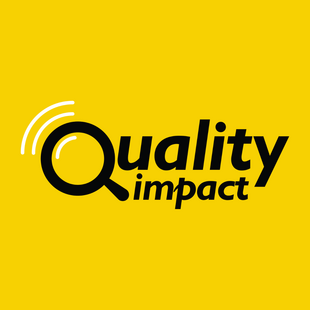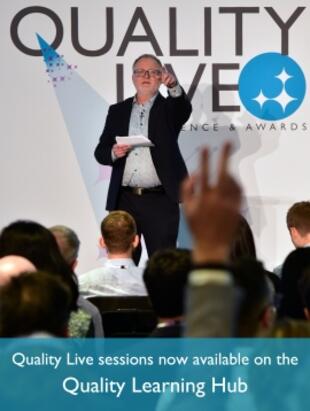
Innovation without compromising compliance
Progress indicator

Nicole Lyons, Head of Regulatory Affairs, Smartway Pharmaceuticals, challenges quality professionals to break the mould and lead with innovation in their organisations.
The theme of this year’s World Quality Week – Quality: Think differently – aims to inspire us quality professionals to rethink how things are done within our respective industries, encouraging changes that are likely long overdue.
However, when your priority is improving quality within an organisation, how do you know when a novel idea is likely to enhance compliance, rather than compromise it?
Innovation requires courage and humility
In the quality world, the status quo is often maintained for too long because it feels safe. A desire for safety is the number one priority all quality professionals have in common, but this means that many companies – especially those operating within heavily regulated industries like the pharmaceutical sector – have conducted very similar processes, in very similar ways, for decades. Quite often, it also means leaving quality in the hands of a dedicated department, with the head of that department facing many difficult questions if things go wrong.
But this is an outdated way of working. Idea generation is key to staying ahead in the 21st century, and collaboration is the safest way to ensure sustainable compliance – with other departments and with the senior leaders of our companies.
Novel ideas are founded on novel understanding
It can feel intimidating to be the first one to declare a new way of doing something if you are the one answering to a government inspector or client auditor. Breaking away from a ‘one size fits all’ process into something more bespoke requires a level of understanding beyond the regulations and guidelines – it involves understanding how the wider business works outside of the quality department. This can only happen through communicating with other departmental leaders, alongside the acceptance that once you have fully assessed the idea and discussed with colleagues, it may not be practical or work as well as you initially thought it would.
"The more of us who think differently, the more conventional it will become."
This is why innovation will only thrive in cultures that allow it to happen. If the senior management team is reluctant to disturb ‘how it’s always been’, your quality team never goes beyond the confines of their office, or the weight of compliance lies solely at the feet of one person, there is little chance of being able to successfully implement change.
Changing perspectives starts with us
It can be difficult to reflect on the fact that our processes are good – for us. After all, a good process will ensure a task is completed in a compliant manner. But for a process to be great, it needs to be not only good for us, but as efficient as possible for our colleagues, as well as providing the highest quality service for our clients. That is when the quality team is seen to add real value to businesses and will be offered an automatic seat at the table without needing to fight so hard for it.
Over the years, the quality profession has not been viewed as the most glamorous of career options – nor the most appreciated among colleagues from other departments. I hear peers allowing for the usual ‘sales prevention’ jokes or accepting the status quo so there is one less battle to fight in an already demanding role. But everyone should acknowledge their position as an opportunity to drive real change by creating a more intentional quality culture – even if other senior leaders do not see it yet.
Start with small, simple steps
There are many companies that still operate via ‘negative interactions only’ – meaning that the only time anyone hears from the quality department is when something has gone wrong. There is little or any acknowledgement when things are going right (which is hopefully the majority of the time!). Even if it is the expected norm, I believe we should start celebrating quality objectives and compliance just as much as noncompliance is penalised.
If you find it difficult to involve other departments or get your senior leadership team on board with integrating quality across the business, lead with curiosity. Informal meetings with different personnel within the company can help you to understand how quality impacts their role, and whether there is something that is significantly hindering their impression of the department.
Frequently, there is at least one part of a process that is relatively arbitrary yet causes a lot of delays or additional pressure on colleagues in another department. If you can resolve that, people will start to shift their perspective and build trust, which then fosters collaboration and innovation.
Once you have an innovative idea, it needs to be explained as clearly as possible. You may have thought about the process every minute of every day for months. However, if someone asks you why you want to do something differently, you must ensure your change management process is detailed enough to leave no questions unanswered.
The most successful ideas are those that appear simple, but are based on heavy pre-emptive risk assessments and a proper change-management process; you must clearly show that you have thought about the drawbacks and improvement areas of the current process, and how it can be improved without diverting risk elsewhere in the process chain.
There is always a chance that a new idea doesn’t work out, which is why the effectiveness should be reviewed at suitable intervals. If risk cannot be sufficiently mitigated, or if the new process doesn’t work for the wider business, you need to be able to accept it and move on.
Using fundamental frameworks
Thinking differently can seem contradictory to everything we are taught – for example, ‘there is nothing safer than an established procedure which has been proven to work’. But if we allow for the proper exploration of ideas generated within our companies, by having appropriate frameworks in place to manage risks and review effectiveness, collaboration and continual improvement ideas will begin to feel more natural, and the better we will all be for it.
The more of us who think differently, the more conventional it will become.
What are your thoughts?
Are you an innovation leader? Do you have some success stories to share with other quality professionals?
We would love to hear from you!
Quality World

Get the latest news, interviews and features on quality in our industry leading magazine.
The latest from the CQI Podcast

Listen to the Quality Impact podcast, where experts share insights on the evolving role of quality across industries.



